Click
on a link:
Run
your cursor over any picture for more information about the
character and talent
 Bajoran;
Bajorans are humanoid in form and function
with the exception of a ridged nose. Slight deviations from Terran
human physiology can be discerned through different reactions to body
change. During pregnancy Bajoran females do not nauseate instead they
react by sneezing. Bajoran fetuses are also irremovable due to the
high degree of vascularization in the placental/uterine interface.
Bajoran;
Bajorans are humanoid in form and function
with the exception of a ridged nose. Slight deviations from Terran
human physiology can be discerned through different reactions to body
change. During pregnancy Bajoran females do not nauseate instead they
react by sneezing. Bajoran fetuses are also irremovable due to the
high degree of vascularization in the placental/uterine interface.
Society and Religion
Bajoran
culture flourished for 500,000 years. In time, the Bajorans became a
race of master artisans, architects, and scholars whose lives are
centered on their faith. Their deeply religious culture honors the
'Prophets' who guide the Bajorans. They believe in guidance from the
prophecies revealed to ancient religious men much in the same way as
the Greeks believed in Delphi Oracles. Within the religious texts of
Bajoran faith, safe passage through the Bajoran wormhole is seen as
the blessing of the Prophets who reside within in the Celestial Temple.
Prophets
The Prophets
are the central figures of the Bajoran faith, transcendent entities
who exist in a non-linear time frame. Bajoran faith believes the
Prophets to be the embodiment of truth, who reveals their wisdom
through visions given by the Orbs. The Prophets are also the ones who
replenish the life force of Bajorans, the 'Pagh' that allows existence.
Orbs;
Approximately
10,000 years ago. The first Orb, with eight others to follow,
appeared in the skies of Bajor. Taken as a gift from the Prophets to
endow their followers with wisdom and insight, the Orbs were
traditionally housed in sacred shrines at temples and monasteries
around Bajor. Each Orb has a different function. After the
Occupation, only one from the original nine Orbs remained. Through
the years, three have been recovered and are currently in the hands
of the Bajoran people. The four Orbs are:
The Ninth Orb:
Green energy form. It places the user into a vivid distant memory.
The Third Orb:
Blue energy form. It is also known as the Orb of Prophesy and Change.
It presents the user with a surrealist projection of the future, open
to interpretation but usually correct in some way.
The Orb of
Wisdom: Pink energy form. Grand Nagus Zek was responsible for the
restoration of this Orb to Bajorans in 2371. It forces overseen
knowledge into the user's attention.
The Orb of
Time: Purple energy form. It can transfer users back or forwards in time.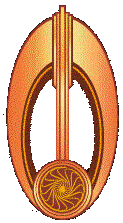
Emissary
The title
given to the person who would discover the Celestial Temple and speak
with the Prophets, then unify the Bajoran people. Kai Opaka announced
Commander Benjamin Sisko was the Emissary when he had just arrived at
the Station. Akorem Laan briefly succeeded Sisko as the Emissary in
2372 when the Prophets transported him two centuries from his
lifetime into the 24nd century. After reinstating the unpopular
D'jarra caste system, Sisko challenged Akorem, and was ultimately
vindicated by the Prophets themselves. Captain Sisko is now firmly
established as the Emissary of Bajor. The one upon whom the hopes of
a whole world fall.
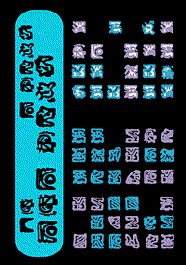 D'jarra
Caste
D'jarra
Caste
Ancient
Bajorans lived their lives according to the d'jarra caste system. A
Bajoran's social status and vocation was dictated by the d'jarra at
birth and usually indicated in part within the design of the earring.
Passed on for generations, the system was abandoned during the
Occupation, when every Bajoran became subservient of the Cardassians.
Earring
The identity
of Bajorans is intrinsically connected to their earring. The designs
is often deeply connected to family lineage and the archaic d'jarra,
but some religious figures and Militia officers are known to change
their earrings to better adapt to their line of work. The earring is
most often worn on the right ear, and is usually diamide-laced
birithium in substance.
Name
Bajoran custom
places the family name before an individual name. Major Kira Nerys is
therefore correctly addressed as Major Kira while her familiar name
is Nerys. The titles of Bajoran rank also are tied to their religious
rank. The Kai is the spiritual leader of Bajoran faithful, and a new
Kai is named only when the preceding Kai dies or is incapacitated.
The Vedek assembly of 112 influential spiritual leaders is lower than
the Kai and acts as assistant and preacher to the masses. The
political leadership of Bajor is given to the First Minister, who can
be any Bajoran national chosen by democratic election. The current
Provisional Government has been in place since the withdrawal of
Cardassian forces. TNG, DS9.

Ba'ku; (left)
The Ba'ku are a people filled with contradictions. Their home world
is unknown, but is believed to be located beyond Federation space.
Some three hundred and fifty years ago the Ba'ku entered a period of
rapidly escalating and uncontrolled technological advancement, to the
point where they were on the verge of destroying themselves. A group
of Ba'ku left their world to begin again, fearing a catastrophe.
Determined not to repeat the mistakes the rest of their people had
made, the Ba'ku adopted a philosophy of near total avoidance of high
technology. The Ba'ku claimed that when a machine was built to do the
work of a person, it took away an essential quality of that person. MOV
Insurrection. 9
Balduk
Warriors; A
fierce group. Worf found them not as frightening as a small angry
child. TNG "New Ground" 5-110
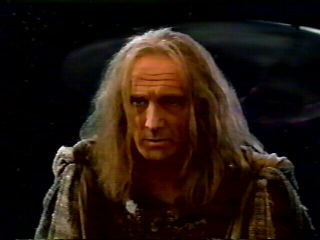
Bandi; (right)
A race of humanoids from Deneb IV. Like the Rigellians, the Bandi
were obviously a people transplanted from their homeworld onto a
terraformed world. Genetic evidence suggests that the Bandi could be
a Terran offshoot. They recently lost their prize possession,
Farpoint Station, and suffered the destruction of their Capitol city.
Since then the Bandi have resorted to their old ways of nomadic
wandering in clans in search of food and resources. The Bandi are
known for their stringy, white and grey hair. TNG
"Encounter at Farpoint" 1-1&2

Baneans;
(left) Spacefaring civilization from the Delta Quadrant. The Baneans
were at war with a neighboring culture, the Numiri, even though the
two once coexisted on one planet. Both
species wear feather-like head coverings. Convicted felons of capital
offenses are punished by implanting the victim's own final memory
engrams into their brain so they can relive their crime through the
victim's point of view every 14 hours. The government is organized in
ministries. They keep pets and smoke a tobacco-like product. VOY
"Ex Post Facto" 1-8
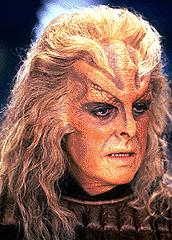 Baran,
Arctus; (right) Unknown race. Shrewd and
ruthless captain of a mercenary vessel who's crew was controlled with
neural servo inplants. Hired by the Vulcan isolationists to find the
fragments of the Stone of Gol. TNG "Gambit,
Part 1" 7-156
Baran,
Arctus; (right) Unknown race. Shrewd and
ruthless captain of a mercenary vessel who's crew was controlled with
neural servo inplants. Hired by the Vulcan isolationists to find the
fragments of the Stone of Gol. TNG "Gambit,
Part 1" 7-156
Bardeezan; A
Bardeezan merchant ship was trying to depart from DS9 in 2370. The
ship was briefly suspected of carrying the abducted Gul Dukat, but
was later cleared. DS9 "The Maquis, Part
1" 2-40
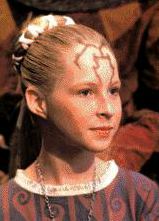
Barkonian; (left)
Humanoid inhabitants of planet Barkon IV. The Barkonians have purple-colored
symmetrical forehead markings. In 2370, their civilization was in a
pre-industrial stage. TNG
"Thine Own Self" 7-168
Barolian; Humanoids
from Barkon IV in Romulan space. Discovered on the fringes of the
Empire in 2364, they were annexed within a year. Considered subjects
of the Romulan Empire, the Barolians industrial and commercial base
is built around supporting the Romulan Empire. Barolian's have a
limited interstellar capacity with only a few dozen freighters mainly
used for commerce with the Romulan Empire. Several rogue or pirate
ships have been sighted. Barolians are humanoids with unusually
photosensitive skin and wear grey or brown robes in public. They have
the ability to see many infrared frequencies, thus allowing them to
work normally in very low light. TNG
"Unification-Part II" 5-108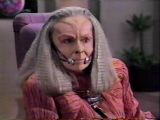
Barzan; (right)
Vaguely feline humanoids from planet of the same name. Barzan II
physiology requires small amounts of ammonia and Barzan's off planet
must wear small breathing apparatus over the cheek. Their homeworld's
atmosphere is toxic and all visitors must wear environmental gear or
stay in one of several orbital stations. Barzan is politically
neutral and has an economy based on rare mineral export and
development of environmental and life support gear.
TNG "The Price" 3-56
Benthan;
Technologically sophisticated civilization from the Delta Quadrant.
Benthan scientists tested a prototype spacecraft that used a coaxial
warp drive propulsion system. VOY "Vis
à Vis"
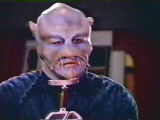 Benzite;
(left) Blue skinned humanoids from Benzar.
A recent member of the Federation, Benzar is similar to most class M
worlds except it has significant quantities of methane, thus
Benzite's off their homeworld require a small device worn over their
face to supply additional gasses. Most Benzites look similar and
Benzites from the same geostructure appear identical to all but other
Benzites. Benzite's are known for innovative computer designs and
programming techniques. TNG
"Coming of Age" 1-19
Benzite;
(left) Blue skinned humanoids from Benzar.
A recent member of the Federation, Benzar is similar to most class M
worlds except it has significant quantities of methane, thus
Benzite's off their homeworld require a small device worn over their
face to supply additional gasses. Most Benzites look similar and
Benzites from the same geostructure appear identical to all but other
Benzites. Benzite's are known for innovative computer designs and
programming techniques. TNG
"Coming of Age" 1-19
Berellian;
A
race of humanoids known for their artistic abilities and technical
ineptitude. While highly advanced in all the arts, their science and
engineering lag centuries behind similar races. They are members of
the Federation and Berellian artworks are quite treasured.
Physically, they are tall humanoids with elongated fingers and feet.
TNG "Redemption, Part II" 5-101
Beta Agni II;
Class-M planet, site of a Federation colony. The Beta Agni II colony
experienced a sudden tricyanate contamination of its water supply in
2366. The contamination was neutralized with the assistance of the
Enterprise-D, which obtained an adequate supply of hytritium, and
delivered it into the planet's subsurface water.
TNG "The Most Toys" 3-70
 Beta
III; (left) Class-M planet located in star
system C-111. The humanoid inhabitants of Beta III once had a
technologically advanced, but war-ridden society. Some 6,000 years
ago, a great leader named Landru united these people by returning
them to a simpler time. Upon his death, Landru's leadership continued
by a sophisticated computer system that governed the people. It was
this Landru that destroyed the starship Archon and absorbed it's
crew. The computer's rule continued until 2267, when Landru was
destroyed while attempting to absorb the crew of the Enterprise. TOS
"Return of the Archons" 1-21
Beta
III; (left) Class-M planet located in star
system C-111. The humanoid inhabitants of Beta III once had a
technologically advanced, but war-ridden society. Some 6,000 years
ago, a great leader named Landru united these people by returning
them to a simpler time. Upon his death, Landru's leadership continued
by a sophisticated computer system that governed the people. It was
this Landru that destroyed the starship Archon and absorbed it's
crew. The computer's rule continued until 2267, when Landru was
destroyed while attempting to absorb the crew of the Enterprise. TOS
"Return of the Archons" 1-21
Beta
Portolan; Home
of an ancient civilization whose population was wiped out centuries
ago by what was
later called Denevan neural parasite. Archaeological evidence
indicated the inhabitants of the Beta Portolan system were the first
victims of these creatures. TOS
"Operation-Annihilate!" 1-29
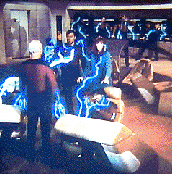 Beta
Renner cloud; (right) An intelligent,
spaceborne entity. The Enterprise-D encountered the life-form near
the Beta Renner star system in 2364. This entity came aboard the
starship and entered the neural systems of several Enterprise-D crew
members, including Captain Picard, in an attempt to establish
communications with life-forms it considered extremely alien. TNG
"Lonely Among Us" 1-7
Beta
Renner cloud; (right) An intelligent,
spaceborne entity. The Enterprise-D encountered the life-form near
the Beta Renner star system in 2364. This entity came aboard the
starship and entered the neural systems of several Enterprise-D crew
members, including Captain Picard, in an attempt to establish
communications with life-forms it considered extremely alien. TNG
"Lonely Among Us" 1-7
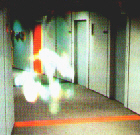 Beta
XII-A entity; (left) Alien life-form of
unknown origin, composed of pure energy, that thrived on the energy
of negative emotions. The entity, first encountered at planet Beta
XII-A, was capable of manipulating matter and the minds of its
victims. It created a confrontation between crew members of a Klingon
ship and the Starship Enterprise in 2268. Pitting these longtime
enemies against each other, the entity fed on their anger, growing
stronger as their hatred increased. The entity was defeated by a
peaceful collaboration between the Klingons and the Enterprise crew. TOS
"Day of the Dove" 3-62
Beta
XII-A entity; (left) Alien life-form of
unknown origin, composed of pure energy, that thrived on the energy
of negative emotions. The entity, first encountered at planet Beta
XII-A, was capable of manipulating matter and the minds of its
victims. It created a confrontation between crew members of a Klingon
ship and the Starship Enterprise in 2268. Pitting these longtime
enemies against each other, the entity fed on their anger, growing
stronger as their hatred increased. The entity was defeated by a
peaceful collaboration between the Klingons and the Enterprise crew. TOS
"Day of the Dove" 3-62

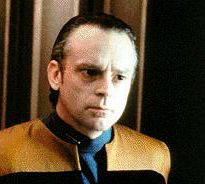 Betazoid;
(right) Betazoids hail from the Federation
member planet Betazed. A peaceful race that have developed highly
telepathic abilities, the Betazoid people appreciate fine arts,
literature, and philosophy. As all Betazoids are telepathic, they
usually do not need to vocalize their thoughts to one another in
order to communicate, but can do so for the benefit of offworlders.
It is a natural ability, and likewise the strength of the skill
varies from one to another. Most develop the ability in adolescence,
but a few have congenitally active telepathic abilities that may
cause severe mental problems due to their inability to screen out
other peoples minds. Screening is a skill that is absolutely
necessary for the well-being of a Betazoid,particularly for those
with keen telepathic sensory skills. Externally, Betazoids are among
the most humanoid species on record, and are indistinguishable from
humans in every aspect but one, they have very black eyes and show no
iris color. They can reproduce with humans, although this often
dilutes the telepathic abilities of the offspring, case in point:
Commander Deanna Troi. The children of such a union often develop
empathic rather than full telepathic abilities, though they can still
communicate telepathically with their Betazoid parent and a bonded
mate. Full Betazoids are unable to read the minds of Ferengi, Breen,
Ullians or Dopterians due to their unusual brain lobe formations, but
some half Betazoids have been occasionally successful in sensing the
emotions of these species.
Betazoid;
(right) Betazoids hail from the Federation
member planet Betazed. A peaceful race that have developed highly
telepathic abilities, the Betazoid people appreciate fine arts,
literature, and philosophy. As all Betazoids are telepathic, they
usually do not need to vocalize their thoughts to one another in
order to communicate, but can do so for the benefit of offworlders.
It is a natural ability, and likewise the strength of the skill
varies from one to another. Most develop the ability in adolescence,
but a few have congenitally active telepathic abilities that may
cause severe mental problems due to their inability to screen out
other peoples minds. Screening is a skill that is absolutely
necessary for the well-being of a Betazoid,particularly for those
with keen telepathic sensory skills. Externally, Betazoids are among
the most humanoid species on record, and are indistinguishable from
humans in every aspect but one, they have very black eyes and show no
iris color. They can reproduce with humans, although this often
dilutes the telepathic abilities of the offspring, case in point:
Commander Deanna Troi. The children of such a union often develop
empathic rather than full telepathic abilities, though they can still
communicate telepathically with their Betazoid parent and a bonded
mate. Full Betazoids are unable to read the minds of Ferengi, Breen,
Ullians or Dopterians due to their unusual brain lobe formations, but
some half Betazoids have been occasionally successful in sensing the
emotions of these species.
Society Betazoid
society tends toward more formal and elaborate traditions and
ceremonies than most cultures in their present evolutionary stage.
Some of the rites often make the more conservative Federation
offworlder uneasy at first, most notably the traditional wedding
ceremony in which no clothing is to be worn. Though there are no
official gender-based restrictions in place within Betazoid society,
women have traditionally held many positions of authority.
Betazoids are
a race of pacific philosophers who are more likely to observe than
act, and consequently have little use for weapons or even defense
systems. Their planetary defense system were outdated the moment they
were finally in place and proved to be 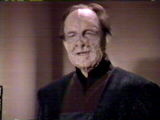 quite
useless when the Dominion . Nonetheless are considered a major world
of the Federation and their fall during the Dominion war in 2374
struck home the devastation that had eaten away at the Federation's
formerly secure borders. TNG "Encounter at
Farpoint" 1-1&2
quite
useless when the Dominion . Nonetheless are considered a major world
of the Federation and their fall during the Dominion war in 2374
struck home the devastation that had eaten away at the Federation's
formerly secure borders. TNG "Encounter at
Farpoint" 1-1&2
Bilanaian;
(right) Federation members from planet Bilana III. Site where
soliton wavy based propulsion was developed. The soliton wave was
generated by an array of massive generators on the surface of Bilana
III and projected toward a sister facility on the planet Lemma II.
The test was not successful. TNG "New
Ground" 5-110
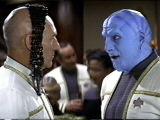 Bolian;
(left) Humanoid race from Bolarus IX
distinguished by light blue skin and a bifurcated ridge running down
the center of the face. Bolians are one of the more active members of
the Federation with supplying a large amount of officers and enlisted
personnel to Starfleet each year along with extensive scientific and
cultural attaches to civilian projects. Bolian culture is one of
service and research. Their sciences are comparable to modern
Federation standards. TNG
"Conspiracy" 1-25
Bolian;
(left) Humanoid race from Bolarus IX
distinguished by light blue skin and a bifurcated ridge running down
the center of the face. Bolians are one of the more active members of
the Federation with supplying a large amount of officers and enlisted
personnel to Starfleet each year along with extensive scientific and
cultural attaches to civilian projects. Bolian culture is one of
service and research. Their sciences are comparable to modern
Federation standards. TNG
"Conspiracy" 1-25
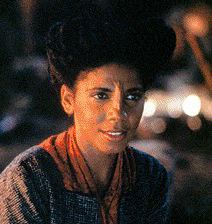 B'omar;
Technologically
sophisticated humanoid civilization from the Delta Quadrant. The
governmetn was willing to permit passage of Voyager but imposed such
severe limitations on the agreement that Voyager personnel elected to
travel around the region instead.A paranoid species who offered a
very convoluted path through their space. VOY
"Raven" 4-74
B'omar;
Technologically
sophisticated humanoid civilization from the Delta Quadrant. The
governmetn was willing to permit passage of Voyager but imposed such
severe limitations on the agreement that Voyager personnel elected to
travel around the region instead.A paranoid species who offered a
very convoluted path through their space. VOY
"Raven" 4-74
Boraalan;
(right) Humanoid inhabitants of planet Boraal II, who lived on a
technological level similar to Earth's medieval period. The planet
underwent a catastrophic transformation in 2370. The planet's
atmosphere suddenly dissipated, rendering it uninhabitable. The
colony observer, Nikolai Rozhenko, broke the Prime Directive when he
tricked the Enterprise personnel into transporting the entire
Boraalan village he had been studying to Vacca VI. Colonists were
housed in a holodeck that Rozhenko had created to fool the Boraalans
into believing they were on a trek to a new area on their own planet.
TNG "Homeward" 7-165
Boranis III;
The population of Boranis III was infected with a plague that
consumed thousands of lives. Dr. Julian Bashir was able to identify
the pathogen and inoculate the entire population. DS9
"The Quickening" 4-96
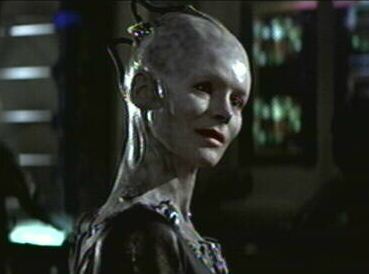
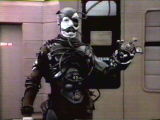 Borg;
(right) The Borg are a race of
"enhanced" humanoids native to the Delta Quadrant.
Originally completely organic, their evolutionary development led
them to create the highly effective hive social structure that
achieves a collective consciousness through cybernetic implants.
Borg;
(right) The Borg are a race of
"enhanced" humanoids native to the Delta Quadrant.
Originally completely organic, their evolutionary development led
them to create the highly effective hive social structure that
achieves a collective consciousness through cybernetic implants.
To the Borg,
individual thought and action are considered imperfect and weak. They
travel through the universe in their hive cubicles seeking new
civilizations to assimilate into their own consciousness, or in their
words, "add the biological and technological distinctiveness of
to their own". They don't simply assimilate individuals, they
devour cultures, races, entire worlds in achieving their
understanding of perfection. If a Borg drone dies or is beyond
repair, his memory will still be retained by the collective. So in a
sense all Borg are immortal.
Each Borg has
cybernetic implants that differ with the specific designated task.
The assimilated drone has only to listen to the murmur of thousands
that transmit into his mind precisely the task at hand, never needing
to decide independently nor worry about what course of action to
take. The result is an outward harmony and complete cooperation among
the drones at the price of surrendering individual thought. Yet such
a life of security has prompted Borgs separated from the collective
to long to lose themselves within the collective again and return to
the hive.
Assimilation
is the Borg's means of adding or replacing drones, as well as their
sole purpose of existence. New technology and knowledge is 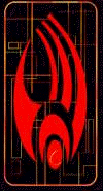 gathered
in this way, and nearly every species encountered has been
assimilated easily. Species 8427 is the notable exception.
Assimilation is achieved by injecting nano-probes below the the
victim's subcutaneous layer into the bloodstream, whose blood cells
are then attacked and subjugated by the probes to work together and
lay the groundwork for connection to the collective. Thousands of
such probes can be injected within seconds, making the effects of
initial assimilation immediate. Bio-technological interface with Borg
cybernetic implants and attachments are also created by the
nano-probes in preparation for surgical procedures that may include
modified extremities for specific tasks, or optical and aural
implants. Constant to all assimilated drones is the neural implant
that is unremovable once installed. It is the actual connection the
drone has to the rest of the collective, relaying all orders while
maintaining records, coordinates, and other information about the
drone's activities.
gathered
in this way, and nearly every species encountered has been
assimilated easily. Species 8427 is the notable exception.
Assimilation is achieved by injecting nano-probes below the the
victim's subcutaneous layer into the bloodstream, whose blood cells
are then attacked and subjugated by the probes to work together and
lay the groundwork for connection to the collective. Thousands of
such probes can be injected within seconds, making the effects of
initial assimilation immediate. Bio-technological interface with Borg
cybernetic implants and attachments are also created by the
nano-probes in preparation for surgical procedures that may include
modified extremities for specific tasks, or optical and aural
implants. Constant to all assimilated drones is the neural implant
that is unremovable once installed. It is the actual connection the
drone has to the rest of the collective, relaying all orders while
maintaining records, coordinates, and other information about the
drone's activities.
Hive Structure
The immense
knowledge of all the assimilated Borg minds function as one, and each
Borg is part of a giant subspace communications network called the
Borg Collective. All critical information is relayed to each Borg
through this network, allowing the instantaneous adaptation and
reaction to any outside factors. The Collective is organized into a
social hierarchy composed of several social hives with drones and a
Borg Queen. The Queen does not function as a breeder of new drones,
but the central consciousness that dictates the will and motives of
the collective. She uses the pronoun "I" instead of
"We" but does not appear to be truly individual, instead
maintaining an awareness above that of an ordinary Borg.
TNG "Q Who?" 2-42, MOV First
Contact 8, VOY
"Scorpion, Part I" 3-68
Boslic; Humanoid
spacefaring civilization. A Boslic freighter docked at station Deep
Space 9 in 2372 and contraband was found aboard the vessel by
security officer Kurn. The Boslic captain pulled out a disruptor and
shot Kurn. DS9. "Sons of Mogh" 4-87
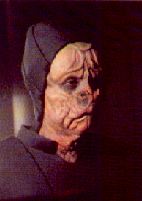
Bothan;
(left) A member of the Botha civilization. Bothans are regarded as a
fiercely territorial society and are endowed with extra-ordinary
telepathic abilities. Using bio-electric energy fields, their psionic
skills can cause mass delusions leading 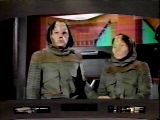 to
catatonic states. Individuals so affected live out secret desires
that are normally suppressed deep within their minds.
VOY "Persistence of Vision" 2-24
to
catatonic states. Individuals so affected live out secret desires
that are normally suppressed deep within their minds.
VOY "Persistence of Vision" 2-24
Bre'ellian;
(right) A planet whose asteroidal moon was
knocked out of its orbit in 2366 by the nearby passage of a black
hole or other celestial object. The moon's new orbit began to decay
rapidly and soon threatened to collide with the planet's surface.
Bre'el IV was heavily populated by a humanoid civilization that might
have been wiped out if the moon did fall. The Enterprise-D made
repeated attempts to return the moon to its proper orbit, but was
unable to do so. The planet was finally saved by a magnanimous
gesture from Q, who returned the moon to a nearly circular, 55,000
kilometer orbit. . Bre'ellians
have blunt noses, knobbed crania and deep-set eye pockets with
practically no jaw movement when speaking. TNG
"Déjà Q" 3-61
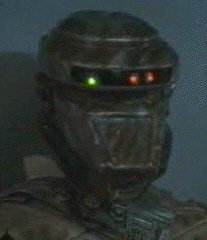 Breen;
(right) A powerful and mysterious Alpha
Quadrant species, the Breen are one of the very few major species
that have evolved on a non-class M world. The Breen homeworld has an
average temperature of approximately -53 C, a record low for any
inhabited planet. They have evolved with a unique physiology in order
to cope with this ultra-cold environment; although they breathe a
fairly standard oxygen-nitrogen atmosphere at close to normal
pressure, the Breen have no blood or other liquid circulatory system.
Instead, their body is permeated by millions of tiny hollow tubules,
which are open to the skin. These allow oxygen to be carried directly
into the body; once there it is absorbed directly through the skin to
be used by the internal organs. A similar process carries the waste
gasses back out again. The Breen reproductive cycle is also unusual,
in that they commonly produce offspring at a very early age. Given
that most known major space faring species live on class M planets
with an average temperature far above that of Breen, the Breen have
had to develop environmental suits of great capability and
reliability in order to co-exist with others. Given their nature, it
is understandable that the Breen have become one of the Alpha
Quadrants leading experts at creating and maintaining extremely cold
environments. They are acknowledged experts on cold storage of
chemical compounds.
Breen;
(right) A powerful and mysterious Alpha
Quadrant species, the Breen are one of the very few major species
that have evolved on a non-class M world. The Breen homeworld has an
average temperature of approximately -53 C, a record low for any
inhabited planet. They have evolved with a unique physiology in order
to cope with this ultra-cold environment; although they breathe a
fairly standard oxygen-nitrogen atmosphere at close to normal
pressure, the Breen have no blood or other liquid circulatory system.
Instead, their body is permeated by millions of tiny hollow tubules,
which are open to the skin. These allow oxygen to be carried directly
into the body; once there it is absorbed directly through the skin to
be used by the internal organs. A similar process carries the waste
gasses back out again. The Breen reproductive cycle is also unusual,
in that they commonly produce offspring at a very early age. Given
that most known major space faring species live on class M planets
with an average temperature far above that of Breen, the Breen have
had to develop environmental suits of great capability and
reliability in order to co-exist with others. Given their nature, it
is understandable that the Breen have become one of the Alpha
Quadrants leading experts at creating and maintaining extremely cold
environments. They are acknowledged experts on cold storage of
chemical compounds.
Society:
Given
the environmental difficulties, casual visits to Breen worlds by
non-Breen are virtually impossible. The Breen strongly discourage
visitors, and all those who do visit Breen worlds are confined to
purpose-designed encampments. Combined with the fact that the Breen
habitually design environmental suits that hide their faces from
view, this has given them their air of mystery. This has been further
enhanced by the fact that some empathic species, most notably
Betazoids, are unable to detect the thoughts or emotions of the
Breen. Much of Breen is known to be a frozen wasteland, and it is
widely thought that the Breen have deliberately avoided large surface
developments for cultural reasons. Normal Breen body temperature is
-38 C; exposure to temperatures above -13 C will kill them.
Politically
nonaligned semi-humanoids from a world near the Black Cluster. The
Breen normally wear heavy robes and an environmental support mask in
a class M environment. Very little is known about their physiology or
culture. Their technology is comparable to many other galactic
powers. Although the Breen are politically nonaligned, many Breen act
as pirates or raiders, jeopardizing their neutrality. The Breen can
not be telepathically detected and have no such abilities themselves.
Nevertheless, much has been discovered about the Breen over the
years. They have developed organic technology to the point where they
routinely use biological spacecraft. Some of these are fitted with
cloaking devices, a technology the Breen apparently invented
independently of the Romulans and Klingons. They use disruptor type
weaponry rather than the phaser technology used by the Federation.
The Breen have
something of an aggressive history; Breen privateers have conducted
raids against other species on several occasions. In 2366 the Breen
attacked and captured the Cardassian vessel Ravinok, using its crew
as slave labor in the Dilithium mines on Dozaria. In 2372 the Breen
also attacked the Bajoran colony of Free Haven. The Romulan saying,
"Never turn your back on a Breen", sums up the reputation
of this curious species. TNG "Hero Worship"5-111
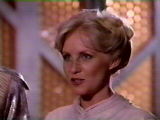 Brekkian;
(left) A humanoid race from Brekka in the
Delos system. Almost identical to Terrans except for a extra
cartridge bridge on the nose and the unique ability to provide a
limited electrical discharge from the hands, while produced at great
strain to the Brekkian, it can incapacitate the unwary. The parent
race of the Onaran race also found in their system. For centuries the
entire Brekkian economy was entirely built around supplying the
narcotic Felicium to Onara, when their last supply freighter failed
in 2364, their economy failed and Onara was able to break their
addiction to Felicium. Since then the Brekkian economy has been in a
depression. Brekkian technology is limited to interplanetary travel
with unusually good development in the refinement of narcotics
illegal in the Federation. The only successful business on Brekka is
selling their narcotics illegally to other worlds in exchange for
supplies or equipment. TNG "Symbiosis" 1-22
Brekkian;
(left) A humanoid race from Brekka in the
Delos system. Almost identical to Terrans except for a extra
cartridge bridge on the nose and the unique ability to provide a
limited electrical discharge from the hands, while produced at great
strain to the Brekkian, it can incapacitate the unwary. The parent
race of the Onaran race also found in their system. For centuries the
entire Brekkian economy was entirely built around supplying the
narcotic Felicium to Onara, when their last supply freighter failed
in 2364, their economy failed and Onara was able to break their
addiction to Felicium. Since then the Brekkian economy has been in a
depression. Brekkian technology is limited to interplanetary travel
with unusually good development in the refinement of narcotics
illegal in the Federation. The only successful business on Brekka is
selling their narcotics illegally to other worlds in exchange for
supplies or equipment. TNG "Symbiosis" 1-22
 Bringloidi;
(right) Colonists from Earth who settled Bringloid V in the Ficus
Sector. The Bringloidi, under the leadership of colony head Danilo
Odell, were Irish descendants who had rejected advanced technology in
favor a more agrarian lifestyle. Bringloid V was threatened by
massive solar flares from the system's star. By 2365, the Bringloidi;
were relocated on planet Mariposa. TNG "Up
the Long Ladder" 2-44
Bringloidi;
(right) Colonists from Earth who settled Bringloid V in the Ficus
Sector. The Bringloidi, under the leadership of colony head Danilo
Odell, were Irish descendants who had rejected advanced technology in
favor a more agrarian lifestyle. Bringloid V was threatened by
massive solar flares from the system's star. By 2365, the Bringloidi;
were relocated on planet Mariposa. TNG "Up
the Long Ladder" 2-44
Briori; Humanoid
civilization native to the Delta Quadrant. The Briori abducted over
300 humans from Earth in 1997 and transported them 70,00 light years
to their homeworld, a Class-L planet in the Delta quadrant, to work
as slaves. Eventually, the slaves revolted, killed the Briori, took
their technology and weapons, and established a civilization on the
former Briori homeworld. VOY "The
37's" 2-17
budding species;
Planet unspecified. A sentient species which reproduces by budding,
apparently asexual -- otherwise nondescript except for the need for a
hatchling pond -- is represented in Starfleet and on Deep Space Nine
by Ensign Vilix'pran, who is reassigned away from the hazardous
materials of Cargo Inspection a month before the buds undergo
hatching. DS9
"Heart Of Stone" 3-60
Buronian; Otherwise
unspecified ancient culture whose pottery resembles both Taguan and
Marlonian, whose fragments Captain Picard once found in a dig on the homeworld.
TNG "Rascals" 6-133
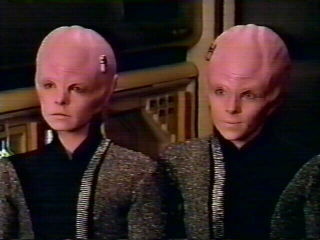 Bynar;
(left) Small
pale skinned humanoids from Bynaus in the Beta Magellan star system.
The Bynars are heavily integrated into their planetary computer
network that is the backbone of their society. Bynars live and work
in pairs and converse entirely in binary code with the assistance of
neural implants and waist mounted buffers. Their home star
experienced a massive electromagnetic pulse in 2364 and required the
massive computer core of a Galaxy class starship to restart it. The
Bynars are recent members of the Federation. TNG
"11001001" 1-15
Bynar;
(left) Small
pale skinned humanoids from Bynaus in the Beta Magellan star system.
The Bynars are heavily integrated into their planetary computer
network that is the backbone of their society. Bynars live and work
in pairs and converse entirely in binary code with the assistance of
neural implants and waist mounted buffers. Their home star
experienced a massive electromagnetic pulse in 2364 and required the
massive computer core of a Galaxy class starship to restart it. The
Bynars are recent members of the Federation. TNG
"11001001" 1-15
Byzallian; Spacefaring
life-forms. Representatives of the Byzallian government were
scheduled to hold a conference at Deep Space Nine in 2371.
DS9 "Defiant" 3-55
Byzatium;
Planet name unspecified. Space-faring race (pronounced
"bye-ZAY-tee-um"), otherwise nondescript, whose six such
ships arrived at Deep Space Nine circa Stardate 48467.3.
DS9 " Defiant" 3-55
Back to top of page
 Bajoran;
Bajorans are humanoid in form and function
with the exception of a ridged nose. Slight deviations from Terran
human physiology can be discerned through different reactions to body
change. During pregnancy Bajoran females do not nauseate instead they
react by sneezing. Bajoran fetuses are also irremovable due to the
high degree of vascularization in the placental/uterine interface.
Bajoran;
Bajorans are humanoid in form and function
with the exception of a ridged nose. Slight deviations from Terran
human physiology can be discerned through different reactions to body
change. During pregnancy Bajoran females do not nauseate instead they
react by sneezing. Bajoran fetuses are also irremovable due to the
high degree of vascularization in the placental/uterine interface.
 D'jarra
Caste
D'jarra
Caste


 Baran,
Arctus; (right) Unknown race. Shrewd and
ruthless captain of a mercenary vessel who's crew was controlled with
neural servo inplants. Hired by the Vulcan isolationists to find the
fragments of the Stone of Gol. TNG "Gambit,
Part 1" 7-156
Baran,
Arctus; (right) Unknown race. Shrewd and
ruthless captain of a mercenary vessel who's crew was controlled with
neural servo inplants. Hired by the Vulcan isolationists to find the
fragments of the Stone of Gol. TNG "Gambit,
Part 1" 7-156

 Benzite;
(left) Blue skinned humanoids from Benzar.
A recent member of the Federation, Benzar is similar to most class M
worlds except it has significant quantities of methane, thus
Benzite's off their homeworld require a small device worn over their
face to supply additional gasses. Most Benzites look similar and
Benzites from the same geostructure appear identical to all but other
Benzites. Benzite's are known for innovative computer designs and
programming techniques. TNG
"Coming of Age" 1-19
Benzite;
(left) Blue skinned humanoids from Benzar.
A recent member of the Federation, Benzar is similar to most class M
worlds except it has significant quantities of methane, thus
Benzite's off their homeworld require a small device worn over their
face to supply additional gasses. Most Benzites look similar and
Benzites from the same geostructure appear identical to all but other
Benzites. Benzite's are known for innovative computer designs and
programming techniques. TNG
"Coming of Age" 1-19 Beta
III; (left) Class-M planet located in star
system C-111. The humanoid inhabitants of Beta III once had a
technologically advanced, but war-ridden society. Some 6,000 years
ago, a great leader named Landru united these people by returning
them to a simpler time. Upon his death, Landru's leadership continued
by a sophisticated computer system that governed the people. It was
this Landru that destroyed the starship Archon and absorbed it's
crew. The computer's rule continued until 2267, when Landru was
destroyed while attempting to absorb the crew of the Enterprise. TOS
"Return of the Archons" 1-21
Beta
III; (left) Class-M planet located in star
system C-111. The humanoid inhabitants of Beta III once had a
technologically advanced, but war-ridden society. Some 6,000 years
ago, a great leader named Landru united these people by returning
them to a simpler time. Upon his death, Landru's leadership continued
by a sophisticated computer system that governed the people. It was
this Landru that destroyed the starship Archon and absorbed it's
crew. The computer's rule continued until 2267, when Landru was
destroyed while attempting to absorb the crew of the Enterprise. TOS
"Return of the Archons" 1-21 Beta
Renner cloud; (right) An intelligent,
spaceborne entity. The Enterprise-D encountered the life-form near
the Beta Renner star system in 2364. This entity came aboard the
starship and entered the neural systems of several Enterprise-D crew
members, including Captain Picard, in an attempt to establish
communications with life-forms it considered extremely alien. TNG
"Lonely Among Us" 1-7
Beta
Renner cloud; (right) An intelligent,
spaceborne entity. The Enterprise-D encountered the life-form near
the Beta Renner star system in 2364. This entity came aboard the
starship and entered the neural systems of several Enterprise-D crew
members, including Captain Picard, in an attempt to establish
communications with life-forms it considered extremely alien. TNG
"Lonely Among Us" 1-7 Beta
XII-A entity; (left) Alien life-form of
unknown origin, composed of pure energy, that thrived on the energy
of negative emotions. The entity, first encountered at planet Beta
XII-A, was capable of manipulating matter and the minds of its
victims. It created a confrontation between crew members of a Klingon
ship and the Starship Enterprise in 2268. Pitting these longtime
enemies against each other, the entity fed on their anger, growing
stronger as their hatred increased. The entity was defeated by a
peaceful collaboration between the Klingons and the Enterprise crew. TOS
"Day of the Dove" 3-62
Beta
XII-A entity; (left) Alien life-form of
unknown origin, composed of pure energy, that thrived on the energy
of negative emotions. The entity, first encountered at planet Beta
XII-A, was capable of manipulating matter and the minds of its
victims. It created a confrontation between crew members of a Klingon
ship and the Starship Enterprise in 2268. Pitting these longtime
enemies against each other, the entity fed on their anger, growing
stronger as their hatred increased. The entity was defeated by a
peaceful collaboration between the Klingons and the Enterprise crew. TOS
"Day of the Dove" 3-62
 Betazoid;
(right) Betazoids hail from the Federation
member planet Betazed. A peaceful race that have developed highly
telepathic abilities, the Betazoid people appreciate fine arts,
literature, and philosophy. As all Betazoids are telepathic, they
usually do not need to vocalize their thoughts to one another in
order to communicate, but can do so for the benefit of offworlders.
It is a natural ability, and likewise the strength of the skill
varies from one to another. Most develop the ability in adolescence,
but a few have congenitally active telepathic abilities that may
cause severe mental problems due to their inability to screen out
other peoples minds. Screening is a skill that is absolutely
necessary for the well-being of a Betazoid,particularly for those
with keen telepathic sensory skills. Externally, Betazoids are among
the most humanoid species on record, and are indistinguishable from
humans in every aspect but one, they have very black eyes and show no
iris color. They can reproduce with humans, although this often
dilutes the telepathic abilities of the offspring, case in point:
Commander Deanna Troi. The children of such a union often develop
empathic rather than full telepathic abilities, though they can still
communicate telepathically with their Betazoid parent and a bonded
mate. Full Betazoids are unable to read the minds of Ferengi, Breen,
Ullians or Dopterians due to their unusual brain lobe formations, but
some half Betazoids have been occasionally successful in sensing the
emotions of these species.
Betazoid;
(right) Betazoids hail from the Federation
member planet Betazed. A peaceful race that have developed highly
telepathic abilities, the Betazoid people appreciate fine arts,
literature, and philosophy. As all Betazoids are telepathic, they
usually do not need to vocalize their thoughts to one another in
order to communicate, but can do so for the benefit of offworlders.
It is a natural ability, and likewise the strength of the skill
varies from one to another. Most develop the ability in adolescence,
but a few have congenitally active telepathic abilities that may
cause severe mental problems due to their inability to screen out
other peoples minds. Screening is a skill that is absolutely
necessary for the well-being of a Betazoid,particularly for those
with keen telepathic sensory skills. Externally, Betazoids are among
the most humanoid species on record, and are indistinguishable from
humans in every aspect but one, they have very black eyes and show no
iris color. They can reproduce with humans, although this often
dilutes the telepathic abilities of the offspring, case in point:
Commander Deanna Troi. The children of such a union often develop
empathic rather than full telepathic abilities, though they can still
communicate telepathically with their Betazoid parent and a bonded
mate. Full Betazoids are unable to read the minds of Ferengi, Breen,
Ullians or Dopterians due to their unusual brain lobe formations, but
some half Betazoids have been occasionally successful in sensing the
emotions of these species.
 quite
useless when the Dominion . Nonetheless are considered a major world
of the Federation and their fall during the Dominion war in 2374
struck home the devastation that had eaten away at the Federation's
formerly secure borders. TNG "Encounter at
Farpoint" 1-1&2
quite
useless when the Dominion . Nonetheless are considered a major world
of the Federation and their fall during the Dominion war in 2374
struck home the devastation that had eaten away at the Federation's
formerly secure borders. TNG "Encounter at
Farpoint" 1-1&2 Bolian;
(left) Humanoid race from Bolarus IX
distinguished by light blue skin and a bifurcated ridge running down
the center of the face. Bolians are one of the more active members of
the Federation with supplying a large amount of officers and enlisted
personnel to Starfleet each year along with extensive scientific and
cultural attaches to civilian projects. Bolian culture is one of
service and research. Their sciences are comparable to modern
Federation standards. TNG
"Conspiracy" 1-25
Bolian;
(left) Humanoid race from Bolarus IX
distinguished by light blue skin and a bifurcated ridge running down
the center of the face. Bolians are one of the more active members of
the Federation with supplying a large amount of officers and enlisted
personnel to Starfleet each year along with extensive scientific and
cultural attaches to civilian projects. Bolian culture is one of
service and research. Their sciences are comparable to modern
Federation standards. TNG
"Conspiracy" 1-25 B'omar;
Technologically
sophisticated humanoid civilization from the Delta Quadrant. The
governmetn was willing to permit passage of Voyager but imposed such
severe limitations on the agreement that Voyager personnel elected to
travel around the region instead.A paranoid species who offered a
very convoluted path through their space. VOY
"Raven" 4-74
B'omar;
Technologically
sophisticated humanoid civilization from the Delta Quadrant. The
governmetn was willing to permit passage of Voyager but imposed such
severe limitations on the agreement that Voyager personnel elected to
travel around the region instead.A paranoid species who offered a
very convoluted path through their space. VOY
"Raven" 4-74
 Borg;
(right) The Borg are a race of
"enhanced" humanoids native to the Delta Quadrant.
Originally completely organic, their evolutionary development led
them to create the highly effective hive social structure that
achieves a collective consciousness through cybernetic implants.
Borg;
(right) The Borg are a race of
"enhanced" humanoids native to the Delta Quadrant.
Originally completely organic, their evolutionary development led
them to create the highly effective hive social structure that
achieves a collective consciousness through cybernetic implants. gathered
in this way, and nearly every species encountered has been
assimilated easily. Species 8427 is the notable exception.
Assimilation is achieved by injecting nano-probes below the the
victim's subcutaneous layer into the bloodstream, whose blood cells
are then attacked and subjugated by the probes to work together and
lay the groundwork for connection to the collective. Thousands of
such probes can be injected within seconds, making the effects of
initial assimilation immediate. Bio-technological interface with Borg
cybernetic implants and attachments are also created by the
nano-probes in preparation for surgical procedures that may include
modified extremities for specific tasks, or optical and aural
implants. Constant to all assimilated drones is the neural implant
that is unremovable once installed. It is the actual connection the
drone has to the rest of the collective, relaying all orders while
maintaining records, coordinates, and other information about the
drone's activities.
gathered
in this way, and nearly every species encountered has been
assimilated easily. Species 8427 is the notable exception.
Assimilation is achieved by injecting nano-probes below the the
victim's subcutaneous layer into the bloodstream, whose blood cells
are then attacked and subjugated by the probes to work together and
lay the groundwork for connection to the collective. Thousands of
such probes can be injected within seconds, making the effects of
initial assimilation immediate. Bio-technological interface with Borg
cybernetic implants and attachments are also created by the
nano-probes in preparation for surgical procedures that may include
modified extremities for specific tasks, or optical and aural
implants. Constant to all assimilated drones is the neural implant
that is unremovable once installed. It is the actual connection the
drone has to the rest of the collective, relaying all orders while
maintaining records, coordinates, and other information about the
drone's activities.
 to
catatonic states. Individuals so affected live out secret desires
that are normally suppressed deep within their minds.
VOY "Persistence of Vision" 2-24
to
catatonic states. Individuals so affected live out secret desires
that are normally suppressed deep within their minds.
VOY "Persistence of Vision" 2-24 Breen;
(right) A powerful and mysterious Alpha
Quadrant species, the Breen are one of the very few major species
that have evolved on a non-class M world. The Breen homeworld has an
average temperature of approximately -53 C, a record low for any
inhabited planet. They have evolved with a unique physiology in order
to cope with this ultra-cold environment; although they breathe a
fairly standard oxygen-nitrogen atmosphere at close to normal
pressure, the Breen have no blood or other liquid circulatory system.
Instead, their body is permeated by millions of tiny hollow tubules,
which are open to the skin. These allow oxygen to be carried directly
into the body; once there it is absorbed directly through the skin to
be used by the internal organs. A similar process carries the waste
gasses back out again. The Breen reproductive cycle is also unusual,
in that they commonly produce offspring at a very early age. Given
that most known major space faring species live on class M planets
with an average temperature far above that of Breen, the Breen have
had to develop environmental suits of great capability and
reliability in order to co-exist with others. Given their nature, it
is understandable that the Breen have become one of the Alpha
Quadrants leading experts at creating and maintaining extremely cold
environments. They are acknowledged experts on cold storage of
chemical compounds.
Breen;
(right) A powerful and mysterious Alpha
Quadrant species, the Breen are one of the very few major species
that have evolved on a non-class M world. The Breen homeworld has an
average temperature of approximately -53 C, a record low for any
inhabited planet. They have evolved with a unique physiology in order
to cope with this ultra-cold environment; although they breathe a
fairly standard oxygen-nitrogen atmosphere at close to normal
pressure, the Breen have no blood or other liquid circulatory system.
Instead, their body is permeated by millions of tiny hollow tubules,
which are open to the skin. These allow oxygen to be carried directly
into the body; once there it is absorbed directly through the skin to
be used by the internal organs. A similar process carries the waste
gasses back out again. The Breen reproductive cycle is also unusual,
in that they commonly produce offspring at a very early age. Given
that most known major space faring species live on class M planets
with an average temperature far above that of Breen, the Breen have
had to develop environmental suits of great capability and
reliability in order to co-exist with others. Given their nature, it
is understandable that the Breen have become one of the Alpha
Quadrants leading experts at creating and maintaining extremely cold
environments. They are acknowledged experts on cold storage of
chemical compounds. Brekkian;
(left) A humanoid race from Brekka in the
Delos system. Almost identical to Terrans except for a extra
cartridge bridge on the nose and the unique ability to provide a
limited electrical discharge from the hands, while produced at great
strain to the Brekkian, it can incapacitate the unwary. The parent
race of the Onaran race also found in their system. For centuries the
entire Brekkian economy was entirely built around supplying the
narcotic Felicium to Onara, when their last supply freighter failed
in 2364, their economy failed and Onara was able to break their
addiction to Felicium. Since then the Brekkian economy has been in a
depression. Brekkian technology is limited to interplanetary travel
with unusually good development in the refinement of narcotics
illegal in the Federation. The only successful business on Brekka is
selling their narcotics illegally to other worlds in exchange for
supplies or equipment. TNG "Symbiosis" 1-22
Brekkian;
(left) A humanoid race from Brekka in the
Delos system. Almost identical to Terrans except for a extra
cartridge bridge on the nose and the unique ability to provide a
limited electrical discharge from the hands, while produced at great
strain to the Brekkian, it can incapacitate the unwary. The parent
race of the Onaran race also found in their system. For centuries the
entire Brekkian economy was entirely built around supplying the
narcotic Felicium to Onara, when their last supply freighter failed
in 2364, their economy failed and Onara was able to break their
addiction to Felicium. Since then the Brekkian economy has been in a
depression. Brekkian technology is limited to interplanetary travel
with unusually good development in the refinement of narcotics
illegal in the Federation. The only successful business on Brekka is
selling their narcotics illegally to other worlds in exchange for
supplies or equipment. TNG "Symbiosis" 1-22 Bringloidi;
(right) Colonists from Earth who settled Bringloid V in the Ficus
Sector. The Bringloidi, under the leadership of colony head Danilo
Odell, were Irish descendants who had rejected advanced technology in
favor a more agrarian lifestyle. Bringloid V was threatened by
massive solar flares from the system's star. By 2365, the Bringloidi;
were relocated on planet Mariposa. TNG "Up
the Long Ladder" 2-44
Bringloidi;
(right) Colonists from Earth who settled Bringloid V in the Ficus
Sector. The Bringloidi, under the leadership of colony head Danilo
Odell, were Irish descendants who had rejected advanced technology in
favor a more agrarian lifestyle. Bringloid V was threatened by
massive solar flares from the system's star. By 2365, the Bringloidi;
were relocated on planet Mariposa. TNG "Up
the Long Ladder" 2-44 Bynar;
(left) Small
pale skinned humanoids from Bynaus in the Beta Magellan star system.
The Bynars are heavily integrated into their planetary computer
network that is the backbone of their society. Bynars live and work
in pairs and converse entirely in binary code with the assistance of
neural implants and waist mounted buffers. Their home star
experienced a massive electromagnetic pulse in 2364 and required the
massive computer core of a Galaxy class starship to restart it. The
Bynars are recent members of the Federation. TNG
"11001001" 1-15
Bynar;
(left) Small
pale skinned humanoids from Bynaus in the Beta Magellan star system.
The Bynars are heavily integrated into their planetary computer
network that is the backbone of their society. Bynars live and work
in pairs and converse entirely in binary code with the assistance of
neural implants and waist mounted buffers. Their home star
experienced a massive electromagnetic pulse in 2364 and required the
massive computer core of a Galaxy class starship to restart it. The
Bynars are recent members of the Federation. TNG
"11001001" 1-15